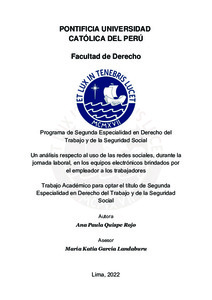| dc.contributor.advisor | García Landaburu, María Katia | |
| dc.contributor.author | Quispe Rojo, Ana Paula | |
| dc.date.accessioned | 2023-03-30T16:55:27Z | |
| dc.date.available | 2023-03-30T16:55:27Z | |
| dc.date.created | 2022 | |
| dc.date.issued | 2023-03-30 | |
| dc.identifier.uri | http://hdl.handle.net/20.500.12404/24577 | |
| dc.description.abstract | En los últimos años la tecnología ha tenido un gran avance, dando paso a que
se creen diversos tipos de redes sociales; asimismo, este avance no ha sido
ajeno al ámbito laboral, lo cual ha generado que se implemente diversos
mecanismos tecnológicos, tales como equipos electrónicos, los cuales tienen
acceso a las diversas redes sociales. Lo anterior, genera situaciones de conflicto
entre el empleador y los trabajadores, debido a que, se debe verificar que el
empleador pueda ejercer su facultad de fiscalización en los equipos electrónicos
involucrados en el desarrollo del giro del negocio a fin de verificar que se estén
usando de idóneamente, sin que ello suponga la vulneración al derecho de
intimidad del trabajador.
Pues bien, el presente artículo académico pretende evaluar si el empleador
puede o no ejercer su facultad de fiscalización sobre los equipos electrónicos
que se le han brindado al trabajador para el ejercicio de sus funciones. Así, y a
fin de llegar a dicha respuesta, se pretende desarrollar las diversas redes
sociales y su implicancia en la relación laboral; la facultad de reglamentación
como mecanismo para no violar el derecho a la intimidad del trabajador; y,
finalmente, la facultad de fiscalización y la sancionadora respecto a las faltas que
cometa el trabajador.
Finalmente, mediante métodos interpretativos de la doctrina, legislación y
jurisprudencia, se llega a la conclusión que el empleador puede ejercer esta
facultad de fiscalización sobre los equipos electrónicos, siempre que se hayan
cumplido previamente ciertos presupuestos respecto a la facultad reglamentaria. | es_ES |
| dc.description.abstract | In the last years technology has had a great advance, giving way to the creation
of various types of social networks; likewise, this advance has not been alien to
the labor field, which has generated the implementation of various technological
mechanisms, such as electronic equipment, which have access to various social
networks. This generates situations of conflict between the employer and the
workers, because it must be verified that the employer can exercise its
supervisory power in the electronic equipment involved in the development of the
business in order to verify that they are being used properly, without this entailing
the violation of the right to privacy of the worker.
This academic article intends to evaluate whether the employer may or may not
exercise its supervisory power over the electronic equipment provided to the
employee for the performance of his duties. Thus, and in order to arrive at such
answer, it is intended to develop the different social networks and their implication
in the labor relationship; the regulatory power as a mechanism to avoid violating
the employee's right to privacy; and, finally, the supervisory power and sanction
with respect to the faults committed by the employee.
Finally, by means of interpretative methods of doctrine, legislation, and
jurisprudence, it is concluded that the employer can exercise this supervisory
power over electronic equipment, provided that certain assumptions regarding
the regulatory power have been previously met. | es_ES |
| dc.language.iso | spa | es_ES |
| dc.publisher | Pontificia Universidad Católica del Perú | es_ES |
| dc.rights | info:eu-repo/semantics/closedAccess | es_ES |
| dc.subject | Redes sociales--Legislación--Perú | es_ES |
| dc.subject | Jornada de trabajo--Legislación--Perú | es_ES |
| dc.subject | Trabajadores--Derechos--Legislación--Perú | es_ES |
| dc.title | Un análisis respecto al uso de las redes sociales, durante la jornada laboral, en los equipos electrónicos brindados por el empleador a los trabajadores | es_ES |
| dc.type | info:eu-repo/semantics/bachelorThesis | es_ES |
| thesis.degree.name | Segunda Especialidad en Derecho del Trabajo y de la Seguridad Social | es_ES |
| thesis.degree.level | Título Profesional | es_ES |
| thesis.degree.grantor | Pontificia Universidad Católica del Perú. Facultad de Derecho | es_ES |
| thesis.degree.discipline | Derecho del Trabajo y de la Seguridad Social | es_ES |
| renati.advisor.dni | 09302661 | |
| renati.advisor.orcid | https://orcid.org/0000-0003-4673-2226 | es_ES |
| renati.author.dni | 72472511 | |
| renati.discipline | 422059 | es_ES |
| renati.level | https://purl.org/pe-repo/renati/level#tituloSegundaEspecialidad | es_ES |
| renati.type | https://purl.org/pe-repo/renati/type#trabajoAcademico | es_ES |
| dc.publisher.country | PE | es_ES |
| dc.subject.ocde | https://purl.org/pe-repo/ocde/ford#5.05.01 | es_ES |






